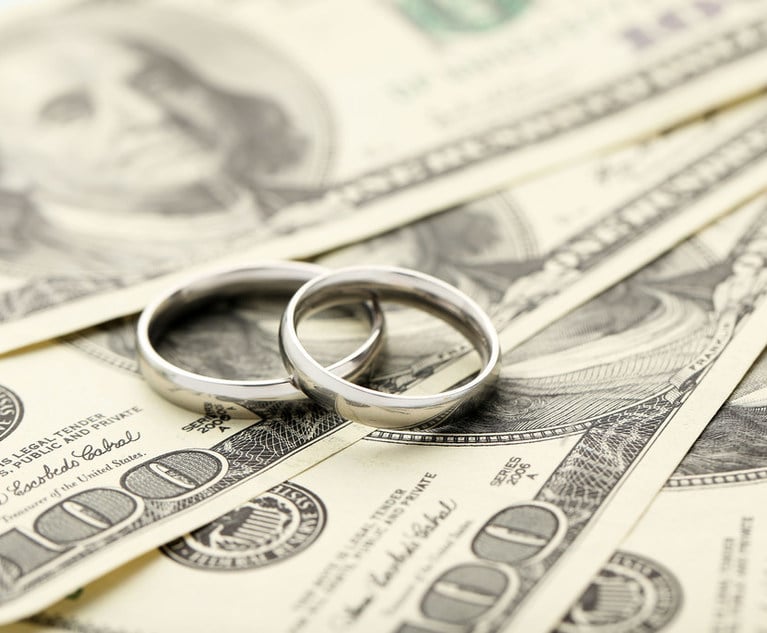 Supreme Court nominee Judge Brett Kavanaugh, left, walks with White House Counsel Don McGahn on Wednesday as they meet senators. Credit: Diego M. Radzinschi / ALM
Supreme Court nominee Judge Brett Kavanaugh, left, walks with White House Counsel Don McGahn on Wednesday as they meet senators. Credit: Diego M. Radzinschi / ALMBrett Kavanaugh Really Didn't Want to Talk About the Federalist Society
"I was the president's nominee. I know he consulted widely—very widely—to get input at least on the people who were finalists," Kavanaugh said Wednesday during an exchange with Sen. Sheldon Whitehouse, D-Rhode Island.
September 05, 2018 at 03:08 PM
4 minute read
U.S. Supreme Court nominee Brett Kavanaugh was pressed Wednesday about what role, if any, the conservative Federalist Society played in his nomination.
Sen. Sheldon Whitehouse, D-Rhode Island, questioned Kavanaugh about comments White House Counsel Donald McGahn made in November that rejected the contention the White House has “outsourced” judge-picking to the Federalist Society. The group has been a major influence in the Trump White House selection of judicial nominees.
“I've been a member of the Federalist Society since law school—still am,” McGahn said then. “So frankly, it seems like it's been in-sourced.”
Whitehouse noted that Kavanaugh had said in the past that it was improper to give one group a preferred position in the nomination process.
Kavanaugh couldn't answer questions about what McGahn meant by the remarks and he said he did not know the “specifics” of the role played by Leonard Leo, executive vice president of the Federalist Society and now an adviser to the president on judicial nominations.
“President Trump made the nomination. I know he spent a lot of time in those 12 days on this issue. I also know Mr. McGahn was directly involved with me.”
Kavanaugh stressed a couple of times that he was discussing his own process, suggesting that he was aware the Federalist Society participated in crafting lists of judges Trump should consider for the courts. He also noted that many lawyers throughout the Trump administration are members of the Federalist Society.
Trump published two lists of potential Supreme Court nominees. Kavanaugh was not on the first list. His name first appeared on a list in November 2017. Kavanaugh, responding to a question from Sen. Mike Lee, R-Utah, who himself was recently considered for the Supreme Court, said nobody from the Federalist Society spoke with him after Justice Anthony Kennedy announced his retirement in late June.
In recounting his own selection process, Kavanaugh, a member of the Federalist Society since 1988, said he received a phone call from McGahn, who subsequently went to the federal courthouse and spoke with Kavanaugh for three to four hours.
“I was the president's nominee. I know he consulted widely—very widely—to get input at least on the people who were finalists,” said Kavanaugh, who served as co-chair of the Federalist Society's school choice subcommittee, religious liberties practice group from 1999 to 2001. Kavanaugh has spoken regularly at Federalist Society-sponsored events.
Heritage Foundation senior legal fellow John Malcolm helped the Trump administration craft its Supreme Court shortlists. Malcolm, director of the Meese Center for Legal & Judicial Studies, pointed to several rulings from Kavanaugh—questioning the power of federal agencies—that made him an attractive candidate.
“Those are topics that I know are of interest to the president and White House Counsel Don McGahn, so perhaps those decisions and his stellar record caused him to rise in the president's esteem,” Malcolm told The National Law Journal this year.
Whitehouse asked why the Bush White House stopped using the American Bar Association in its judicial nomination process. Prior presidents had given the ABA advance notice of nominees for the purpose of that organization's rating of a nominee's qualifications.
Kavanaugh said the Bush White House believed it was inappropriate to continue that practice because the ABA often was an amicus party in cases before the Supreme Court.
Whitehouse also pressed Kavanaugh on whether it should give him or anyone “pause” on the role of large corporate donors in the nomination and confirmation process, particular since those donors' identities do not have to be disclosed.
“First and foremost, that is a policy question for Congress,” said Kavanaugh, adding that the legislative branch can enact disclosure rules.
Read more:
This content has been archived. It is available through our partners, LexisNexis® and Bloomberg Law.
To view this content, please continue to their sites.
Not a Lexis Subscriber?
Subscribe Now
Not a Bloomberg Law Subscriber?
Subscribe Now
NOT FOR REPRINT
© 2024 ALM Global, LLC, All Rights Reserved. Request academic re-use from www.copyright.com. All other uses, submit a request to [email protected]. For more information visit Asset & Logo Licensing.
You Might Like
View All
After 2024's Regulatory Tsunami, Financial Services Firms Hope Storm Clouds Break


Solana Labs Co-Founder Allegedly Pocketed Ex-Wife’s ‘Millions of Dollars’ of Crypto Gains
4 minute read
Federal Judge Sets 2026 Admiralty Bench Trial in Baltimore Bridge Collapse Litigation
3 minute readTrending Stories
- 1Many Southeast Law Firms Planned New, Smaller Offices in 2024
- 2On the Move and After Hours: Goldberg Segalla, Faegre Drinker, Pashman Stein
- 3Recent FTC Cases Against Auto Dealers Suggest Regulators Are Keeping Foot on Accelerator
- 4‘Not A Kindergarten Teacher’: Judge Blasts Keller Postman, Jenner & Block, in Mass Arb Dispute
- 5A&O Shearman, Hogan Lovells and the Stories That Shaped Africa This Year
Who Got The Work
Michael G. Bongiorno, Andrew Scott Dulberg and Elizabeth E. Driscoll from Wilmer Cutler Pickering Hale and Dorr have stepped in to represent Symbotic Inc., an A.I.-enabled technology platform that focuses on increasing supply chain efficiency, and other defendants in a pending shareholder derivative lawsuit. The case, filed Oct. 2 in Massachusetts District Court by the Brown Law Firm on behalf of Stephen Austen, accuses certain officers and directors of misleading investors in regard to Symbotic's potential for margin growth by failing to disclose that the company was not equipped to timely deploy its systems or manage expenses through project delays. The case, assigned to U.S. District Judge Nathaniel M. Gorton, is 1:24-cv-12522, Austen v. Cohen et al.
Who Got The Work
Edmund Polubinski and Marie Killmond of Davis Polk & Wardwell have entered appearances for data platform software development company MongoDB and other defendants in a pending shareholder derivative lawsuit. The action, filed Oct. 7 in New York Southern District Court by the Brown Law Firm, accuses the company's directors and/or officers of falsely expressing confidence in the company’s restructuring of its sales incentive plan and downplaying the severity of decreases in its upfront commitments. The case is 1:24-cv-07594, Roy v. Ittycheria et al.
Who Got The Work
Amy O. Bruchs and Kurt F. Ellison of Michael Best & Friedrich have entered appearances for Epic Systems Corp. in a pending employment discrimination lawsuit. The suit was filed Sept. 7 in Wisconsin Western District Court by Levine Eisberner LLC and Siri & Glimstad on behalf of a project manager who claims that he was wrongfully terminated after applying for a religious exemption to the defendant's COVID-19 vaccine mandate. The case, assigned to U.S. Magistrate Judge Anita Marie Boor, is 3:24-cv-00630, Secker, Nathan v. Epic Systems Corporation.
Who Got The Work
David X. Sullivan, Thomas J. Finn and Gregory A. Hall from McCarter & English have entered appearances for Sunrun Installation Services in a pending civil rights lawsuit. The complaint was filed Sept. 4 in Connecticut District Court by attorney Robert M. Berke on behalf of former employee George Edward Steins, who was arrested and charged with employing an unregistered home improvement salesperson. The complaint alleges that had Sunrun informed the Connecticut Department of Consumer Protection that the plaintiff's employment had ended in 2017 and that he no longer held Sunrun's home improvement contractor license, he would not have been hit with charges, which were dismissed in May 2024. The case, assigned to U.S. District Judge Jeffrey A. Meyer, is 3:24-cv-01423, Steins v. Sunrun, Inc. et al.
Who Got The Work
Greenberg Traurig shareholder Joshua L. Raskin has entered an appearance for boohoo.com UK Ltd. in a pending patent infringement lawsuit. The suit, filed Sept. 3 in Texas Eastern District Court by Rozier Hardt McDonough on behalf of Alto Dynamics, asserts five patents related to an online shopping platform. The case, assigned to U.S. District Judge Rodney Gilstrap, is 2:24-cv-00719, Alto Dynamics, LLC v. boohoo.com UK Limited.
Featured Firms
Law Offices of Gary Martin Hays & Associates, P.C.
(470) 294-1674
Law Offices of Mark E. Salomone
(857) 444-6468
Smith & Hassler
(713) 739-1250










